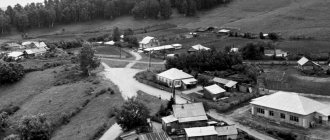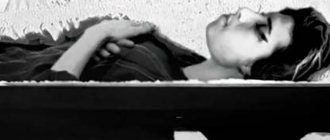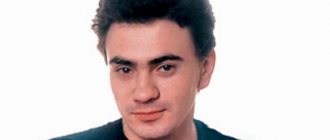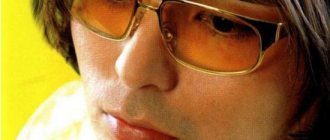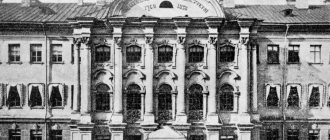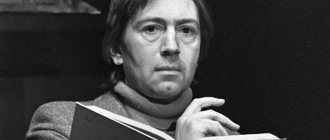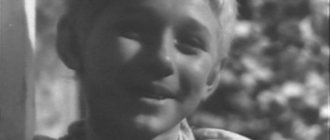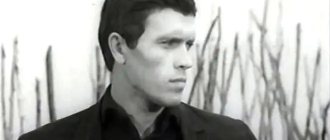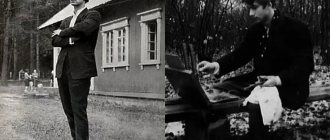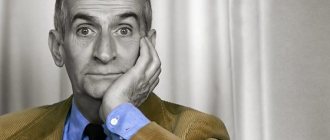Biography. The beginning of the way
First, let's briefly look at the biographical information. Vasily Makarovich was born in 1929 in the Altai village of Srostki. His father, Makar Leontyevich, was only seventeen years old when his son was born. At the age of 21, Shukshin’s father was arrested and soon shot. In 1956 he will be rehabilitated. In the meantime, little Vasily is growing up with the stigma of “son of an enemy of the people”...
Little Vasya with his mother
Shukshin served in the navy, before that he worked for a short time on a collective farm, studied at an automobile technical school (but never graduated). It was while serving in the army that the guy first began writing stories that he read to his colleagues. In 1953, he was transferred to the reserve due to a stomach ulcer.
Returning to his native village, the talented young man passed the exams as an external student and received a matriculation certificate. For some time he even worked at a local school as a literature teacher. Then he met his colleague Maria Shumskaya. A romance ensued. The lovers soon went to the registry office, signed, but right at the exit from the Wedding Palace they quarreled. Vasily told his newly-made wife that he was going to go to conquer Moscow. The quiet and modest provincial girl did not like this idea, and she said: “I will wait for you here.” Shukshin was beside himself with anger, he came home alone and kept exclaiming: “Well, I got married!”
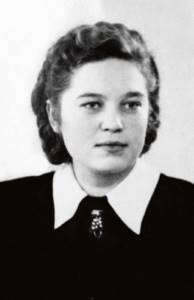
Maria Shumskaya
Subsequently, already from Moscow, he will write to Shumskaya more than once, asking for a divorce. But she will refuse every time. Vasily had to deliberately lose his passport - this was the only way he could get rid of the “mistake of youth.” Despite this act, the writer continued to remember his first lover all his life. He admitted to his friends: “This is the only woman to whom I am guilty...”.
Conquest of Moscow
In 1954, Shukshin went to enroll in VGIK, and in 1960 he graduated from the directing department. The first story of the young talent was published in 1958.
The prominent guy began to be invited to films - his debut was the main role in the film “Two Fedoras”. He marries again - to the daughter of the writer Anatoly Sofronov, Victoria. In 1965, daughter Ekaterina will appear. Although Shukshin broke up with his second wife quite quickly, he did not forget about his daughter - he visited, took care of her, and gave gifts.
In 1963, Vasily made his first full-length film, “There Lives Such a Guy.” The main female role is played by the new lover, Lydia Alexandrova. A year later, Shukshin will meet the main woman of his life - and also Lydia (Fedoseeva). For several years he will rush from one to another, but after the birth of his daughter Masha he will settle down and go to Lydia the second forever.
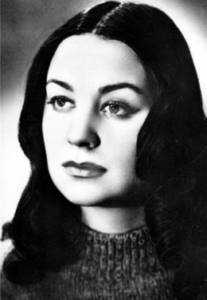
Lidiya Alexandrova (Chashchina)
Alexandrova (after Chashchin’s second husband) will subsequently give an interview where she will reveal the second, “dark” side of Shukshin’s personality. They say that he was so eager for fame that he was ready for anything - deception, meanness, and beat her... It is difficult to judge which of this is true and which is not entirely... However, the actual fact is that the great writer had problems with alcohol, and the problems are serious. Lidiya Fedoseeva also recalled that he could go on a drinking binge. One day she returned from filming and saw her husband lying in the entrance completely drunk. She had to drag him on herself... After the birth of her first daughter Maria in 1967, Vasily Makarovich made a vow not to drink and kept his word.
In the 1960s, Shukshin began to actively publish. His dream was to direct a film about Stepan Razin, his favorite historical hero. He wrote the script, but Goskino refused to direct it.
The 1970s were especially fruitful - the films “Stoves and Benches” and “Kalina Krasnaya” were released, which are still loved by the people. The author's first collection of short stories has been published. The family of four - another daughter, Olga, was born in 1968 - finally moved into a spacious four-room apartment in a prestigious area of Moscow. It seemed that everything was going as well as possible...
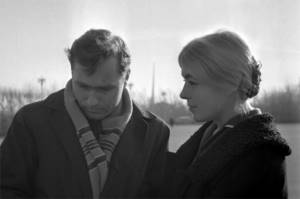
Vasily Shukshin and Lidiya Fedoseeva
“Only three times, at most five, he declared his love to me”: personal life
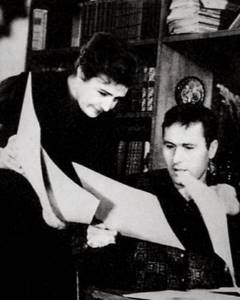
Vasily Shukshin and editor of the Moscow magazine Victoria Sofronova. Illustration from the book “Shukshin” by Alexey Varlamov from the series “Life of Remarkable People”. Moscow: Publishing House "Young Guard", 2015
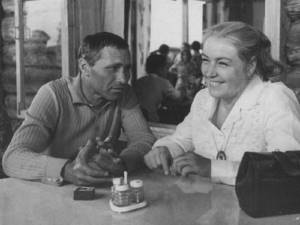
Vasily Shukshin as Yegor Prokudin and Lydia Fedoseeva-Shukshina as Lyuba in Vasily Shukshin’s feature film “Kalina Krasnaya” (1973)
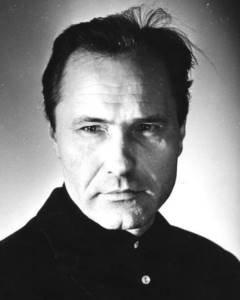
Vasily Shukshin. 1972 (?). Photo: State Museum of the History of Literature, Art and Culture of Altai, Barnaul
Vasily Shukshin’s first wife was his fellow villager Maria Shumskaya. They met at school, corresponded for several years, and married in 1956. However, the marriage did not work out: Shumskaya did not follow Shukshin to Moscow, but remained in Srostki. The writer’s mother recalled: “I was pleased with Vasya’s choice, especially since Marusya’s parents were respected people in the village. But Vasya left for Moscow soon after the wedding, and you see what kind of people there are? Especially artists. That’s it, I didn’t return to her.” In 1957, the writer asked Shumskaya for a divorce, but was refused.
Shukshin lived for several years with actress Lydia Alexandrova, who left memories of him. In 1964, the director met the editor of the Moscow magazine, Victoria Sofronova, the daughter of the writer Anatoly Sofronov. They had a daughter, Katerina, who became a translator.
In the same year, on the set of Eduard Bocharov’s film “What is it like, the sea?” Shukshin met with actress Lydia Fedoseeva. In order to marry her, the writer deliberately “lost” his old passport - information about his marriage to Maria Shumskaya was not added to the new one. Shukshin filmed Fedoseeva twice in his films. She played the main roles in the films “Stoves and Benches” and “Kalina Krasnaya”. From his marriage to Fedoseeva, the writer had two children - daughters Maria and Olga. Both became actresses. Lydia Fedoseeva recalled: “In the 10 years of our life, he declared his love to me only three times, maybe five times, and even then - out of resentment or jealousy. And at the same time he knew me well, understood ... "
"They fought for their homeland"
In 1974, Sergei Bondarchuk invited Shukshin to play the main role in his new film “They Fought for the Motherland.” During the filming period, the writer was also actively working on a novel about Stenka Razin “He Came to Give You Freedom,” as well as a new script - the idea of making a film about the legendary rebel did not leave him.
The film crew lived on the Danube motor ship moored near the Kletsky farm. Vasily Makarovich hardly slept - tedious shooting during the day, creativity at night. To keep himself in good shape, he smoked tirelessly, drank coffee - cup after cup... Of course, this could not but affect his well-being.
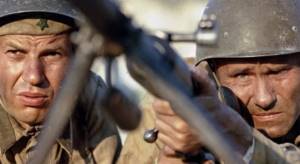
Georgy Burkov and Vasily Shukshin in the film “They Fought for the Motherland”
Circumstances of death
But now the shooting has come to an end. The whole group joyfully celebrated this event. On the evening of October 1, 1974, Shukshin and his friend, actor Georgy Burkov, went to take a steam bath. On the way, they accidentally ran over a running cat - and this made a painful impression on the writer, although he did not believe in omens... Then the friends returned to the ship and watched the USSR-Canada hockey match. After watching, Shukshin and Burkov went to their cabins.
But Burkov could not sleep; at four o’clock in the morning he went out onto the deck to get some fresh air and saw Vasily there holding his heart. "What's happened?" - asked the actor. “Yes, something is wrong with my heart, I need to look for some pills or something...” As luck would have it, the doctor was not on the ship that day - he had gone to celebrate the wedding of a relative. After running around the cabins, Georgy found Zelenin's drops. Shukshin drank almost everything and went to his room. Burkov suggested: “Let me stay with you!” But the writer was adamant - “What am I, girl, to protect me?”
In the morning, Georgy went into his friend’s cabin and saw that he was lying motionless. I thought he was sleeping and didn’t wake him up, but my heart was restless. I met Nikolai Gubenko and asked him to push Shukshin out of the way. But the writer’s heart had already stopped.
Funeral
First, the writer was allocated a plot at the Vvedensky cemetery. But Sergei Bondarchuk personally intervened and, with his authority, secured a place at the prestigious Novodevichy. Once upon a time, Shukshin and Lydia Fedoseeva walked here in search of the grave of the beloved poet Vasily Makarovich - Sergei Yesenin. They did not know then that he was buried at Vagankovsky. While walking, the writer said thoughtfully: “I would like to lie here. But they won’t bury him.” The wife suddenly burst out - she herself did not understand how - the prophetic words: “No, Vasya, I will bury.” “Well, look,” was the answer. Now the loving wife has fulfilled her promise...
The farewell ceremony took place at the House of Cinema on October 7. A huge number of people came, and everyone carried viburnum... And also icons, crosses... After all, they were seeing off the people’s idol himself. People specially came from other cities.
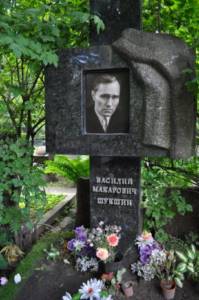
Grave at Novodevichy Cemetery
The “strange” death of Vasily Shukshin
The death of Vasily Shukshin, who died suddenly on October 2, 1974 on the ship “Danube” during the filming of Sergei Bondarchuk’s film “They Fought for the Motherland,” is still shrouded in mystery.
Many gossiped that Shukshin died from drunkenness. It is reported that the writer had long been tormented by attacks of stomach ulcers, which had plagued him since his youth, when he suffered from an addiction to alcohol. However, for the last seven years, according to the writer’s wife Lydia Fedoseeva-Shukshina, he has not touched alcohol.
In addition, the official diagnosis - heart failure - only aggravated suspicions about his violent death. Eyewitnesses, such as the actor, Shukshin’s friend, Georgy Burkov, who discovered him first, took some secrets of Shukshin’s death to the grave.
The questions remained unanswered. And yet, some people are still trying to remind us of this.
Did “heart attack” gas lead to death? (excerpt from the publication of journalist Felix Medvedev in the Versiya newspaper, August 31, 2004)
I remember these crazy farewells at the House of Cinema on Vasilievskaya and at the Novodevichy cemetery. Moscow had not seen anything like this, as the old-timers said then, since Mayakovsky’s funeral. The emotional intensity was enormous; tens of thousands of people gathered.
Rumors about an allegedly violent death gave the farewell to Shukshin a mystical character. The authorities began to truly fear him. What is worth is the fact that he devoted a lot of time and effort to making his rebellious film about Stepan Razin. And they didn’t seem to prohibit it, but they put various obstacles to the implementation of the author’s plan.
Shukshin’s death is truly mysterious; a lot of questions remain. Even eyewitnesses, such as actor Burkov, took the secrets of Shukshin’s death to the grave.
Burkov refused to talk publicly about the last day of Shukshin’s life until his death. If he was forced to appear at the next wake, he would get drunk and not come at all.
One day, while on a business trip to the USA with director Sergei Bondarchuk, I decided to find out from him the secret of Shukshin’s death. He only hinted: “Death is strange. Official diagnosis: heart failure. But before filming, Shukshin was examined at the Kremlin hospital and nothing serious was found.”
Someone spread a rumor that on that fateful evening a “heart attack” gas was released into the cabin where Shukshin lived, leaving no traces. They say that in this way we have since gotten rid of a sufficient number of unwanted people.
Alexander Pankratov-Cherny: Shukshin was poisoned
And once again the artist Alexander Pankratov-Cherny, who together with others (Valery Zolotukhin, Alexey Buldakov, Lyudmila Khityaeva) came to Altai for the annual All-Russian Shukshin Readings, recalled this hushed-up event. On Wednesday, July 22, at the State Philharmonic of the Altai Territory, Pankratov-Cherny made a statement that was unexpected for everyone, Komsomolskaya Pravda reports.
“Vasya Shukshin was killed! And then they wanted to kill me too!” said Pankratov-Cherny when he was given the floor. “A few years ago on Mount Pickett I said this out loud. After that, an attempt was made on me. Later I met a KGB colonel and asked: “Well, why didn’t you finish me off completely?” And he replied: “We don’t kill for the truth.”
Pankratov-Cherny also stated that, according to Nonna Mordyukova, Shukshin “felt fine during the filming, he did not have any heart disease. Shukshin's body was not opened! He was sent from Volgograd in a zinc coffin, with dyed hair, just as he was filmed.”
According to the actor, many people knew about this - Sergei Bondarchuk, Georgy Burkov, and others. But everyone is afraid to talk about it out loud. Pankratov-Cherny also mentioned his guesses as to why Vasily Makarovich was killed, Amitel reports.
“They wanted to destroy the Russian spirit with Shukshin. They were afraid that Vaska was going to make a film about Stenka Razin. Wow, he would have played it so well that it wouldn’t have seemed too much! So they were afraid that he would call the people to revolt.”
Alexander Pankratov-Cherny about Shukshin (excerpt from the publication of journalist Felix Medvedev in the Versiya newspaper, August 31, 2004)
I consider Shukshin the only follower of Gogol and Dostoevsky. I’m re-reading Vasil Makarych - how simple and good-natured his stories are and at the same time how deep and serious they are. Regarding one of my films, they even told me in Soviet times: “Pankratov-Cherny discovered Dostoevism in Shukshin’s work.” That's right, I looked for Dostoevsky in Shukshin - and found it. And Vasil Makarych found the truth in Gogol. Once he told me: “I’m writing a story, I’m stalling on something. Look at Gogol, what did he write?! The bird-three rushes through all the countries and states, but who is sitting in the chaise? And who is driving this chaise? Is it really impossible to change Russia?”
I have been fighting for Shukshin all my life. Nowadays it’s a hectic time, you can’t go anywhere without money. For your performances based on Shukshin, you have to beg them from the governors, and everything is not easy for them: one promised, but flew out of his chair, the other kept feeding him with promises, and the third responded: “Excuse me, Sasha, but what did Shukshin do for Altai?” Can you imagine! Well, how to answer this, and I just shrugged: “It seems to me that he did as much for Russia as for all of world literature.”
Shukshin was buried where he wanted after all (excerpt from the publication of journalist Felix Medvedev in the Versiya newspaper, August 31, 2004)
Shukshina also spoke about one mystical conversation with her husband, when they, walking through the Novodevichy cemetery, were looking for the grave of Yesenin, whom Shukshin loved very much. They did not know then that Yesenin’s grave was located on Vagankovsky.
“We are leaving the cemetery,” says Shukshina, “Vasya is silent. And suddenly he spoke dully, humbly: “Whatever happens to me, they won’t bury me here.” And without any second thought I blurted out: “No, Vasya, I’ll bury you.”
And he: “Well, look.” How such terrible prophetic words escaped me, I don’t know. Apparently, the Lord needed to put them in my mouth. And his grave is located in the alley with the classic writers.”
True, in order for the actor and writer beloved by the people to be buried in the prestigious cemetery of the Novodevichy Convent, as Lydia Nikolaevna once promised Vasily Makarovich, they had to go all the way to Prime Minister Kosygin.
Suspicions
The official cause of death was myocardial infarction due to heart failure. But Shukshin’s relatives immediately questioned the doctors’ version. It seemed incredible that a still young man, only forty-five years old, and suddenly heart failure... Vasily Makarovich never seemed to complain about his heart. Yes, and shortly before his death, he was checked in the hospital, and no heart problems were found. Something is wrong here... Burkov, his wife, Lidiya Fedoseeva-Shukshina, and many other relatives and friends of the writer thought so.
Georgiy himself, who was the first to enter the cabin in the morning, subsequently claimed that the sharp smell of cinnamon hit his nose - and this is precisely the smell of the so-called “heart attack gas”. In addition, all of Shukshin’s manuscripts were scattered - it looked like someone was looking for something... By the way, the behavior of the writer’s friend was strange - it turns out that when he entered the cabin, he immediately left - why? And then for some reason he asked another person to wake up Vasily? What is the reason for this behavior? Or maybe the actor was just scared of something? Let's try to find answers to these questions...
Burkov himself was firmly convinced that his friend was killed. Subsequently, he stated to his close acquaintances that on that fateful morning, when he entered the cabin, he actually saw someone’s hand flashing - as if someone was here and hiding... This scared the actor, and he went for help.
There are other “misunderstandings”. For example, witnesses testified that the writer was lying in an unnatural position, as if twisted. The cabin was in disarray. And in the forensic photographs everything is neat and clean. Suspicious?
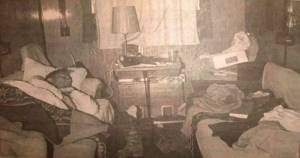
The photo was taken on October 2, 1974 in the cabin of the motor ship "Danube"
According to the testimony of Nonna Mordyukova, who starred with Shukshin, no autopsy was performed on the body; it was transported to Moscow in a zinc coffin. By the way, the actress was wrong here - an autopsy was just carried out, and it established the cause of death. But a re-opening was refused.
Once Burkov told about one more detail - when the friends parted at Shukshin’s cabin, he entered and saw a cup of coffee on the table. He drank, glad that someone took care of him. And the next morning that cup was no longer there...
Death
The mystery of Shukshin's death remained unsolved to the end. During the filming of the last film with his participation, “They Fought for the Motherland,” Shukshin experienced another exacerbation of a peptic ulcer. At times the attacks were serious; according to eyewitnesses, he walked as pale as death. According to the popular version, despite the fact that after the birth of his children Vasily Shukshin gave up alcohol, it was his addiction that killed him.
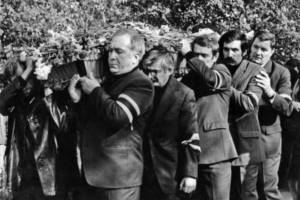
Funeral of Vasily Shukshin
However, there is another version according to which Shukshin could have been poisoned. In the end, no one told the truth, but his wife Lidiya Fedoseeva-Shukshina recalled that her husband felt danger and assumed that something might happen to him.
One day, the great director Sergei Bondarchuk said that Shukshin could have been poisoned, because on the eve of filming the actor was examined at the Kremlin hospital, and no serious pathologies were identified. According to rumors, a “heart attack” gas could have been released into the cabin of the ship where Shukshin’s body was found, which leaves no traces of exposure. And the official version of death was a heart attack.
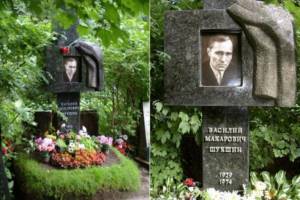
Grave of Vasily Shukshin
Shukshin Vasily Makarovich was buried on October 7, 1974 at the Novodevichy cemetery in the capital. A huge number of people came to the funeral, and everyone left a sprig of red viburnum on the grave. Vladimir Vysotsky specially wrote a song: “In memory of Vasily Shukshin.” According to the recollections of his wife, Shukshin believed that people began to hate each other more, so with his creativity he tried to make people remember goodness.
Motives for murder
And yet, if what happened was a murder, then what motive did the killers pursue? And who was it?
According to supporters of this version, Shukshin’s death was beneficial to the Soviet authorities and the KGB. Allegedly, this was how they dealt with unwanted people. But why was the writer dangerous?
The thing is that in 1974 the script for the film about Razin was finally approved. Filming had already been scheduled. However, the authorities allegedly feared that such a vivid picture from the actor and director adored by the people could provoke a riot. A fighter against the tsarist regime could make people think that everything in their lives is also not so good, and the promised “communism” is somehow not coming.
Actor Alexander Pankratov-Cherny is confident that the soulful, brilliant performance of Vasily Makarovich could rouse everyone to revolt. After all, the oppression of power is the same at all times.
In support of the official version
Many people, when a great person dies - including his loved ones - begin to see something mystical or suspicious in his death. Until now, many sincerely consider the deaths of, for example, Sergei Yesenin or Vladimir Vysotsky, to be violent...
In any unclear case, one must look for a motive. With all due respect to supporters of the murder version, their presentation of motives cannot be called convincing enough. In those years there were tougher and more obvious “freethinkers”; they could have been imprisoned, they could have been persecuted in the press. But stories about some unknown gas or poison in a cup of coffee somehow do not fit in with fears of things to come; if the authorities were so afraid of this not yet finished picture, then why didn’t they simply ban it? How was this already in 1965? Shukshin’s authority didn’t allow it? Really? Back then, they weren’t ashamed to refuse even masters – if it was the “will of the party.” So this all looks very unconvincing.
You may ask: what about Burkov’s evidence? How to explain them? The whole point is that the actor invariably gave these “testimonies” while “drunk,” as evidenced by those to whom he told this. After Shukshin’s death, many tried to find out from Burkov the reasons for this tragedy and demanded a story about the last minutes of the genius. George himself did not like to talk about it. Why? Here, too, everything can be explained quite logically. Think about it: your friend is feeling bad, but you only bring some drops. And then you just let him go to the cabin - without even checking whether it has become easier. No, Burkov has absolutely nothing to blame. This is a tragic coincidence. Although, perhaps, if he had been a little more persistent, the writer could have been taken, for example, to the hospital. And, apparently, until the end of his life, the actor felt guilty for not insisting, not asking, and stepping aside. To somehow justify himself, he may have come up with a story about a cup of coffee, etc. It’s strange somehow - then a poisoned drink appears, then suddenly “heart attack” gas. The “security officers” were afraid that the poison would not work and decided to “finish off” or what? Unclear.
But what about the hand noticed by Burkov on the morning of October 2? Was he really scared? Maybe yes, maybe not. It is quite possible that he saw something there in the dark - the curtains were closed. But most likely, he simply decided not to wake up his friend - after all, he knew that Shukshin was working hard and needed rest. Maybe Georgy was afraid that the writer would get angry - you never know... But his soul was restless, and he sent Gubenko - Shukshin did not communicate with him so closely, and would hardly have scolded him for waking up early. In general, from Burkov’s stories it is clear that Georgy Ivanovich was clearly afraid of his eminent comrade - he had a bad character. That’s why I didn’t insist on spending the night in his cabin, didn’t insist on going to the hospital, etc. And then I was tormented...
And yes, Vasily Makarovich “gave up” with alcohol. But Burkov is not. He could well have had a drink in honor of the end of filming - God himself commanded. And this may also partly explain the apparent “indifference” of the actor, his reluctance to insist on hospitalization, etc.
As for the disorder, which in the photo turned into order. First, the concepts of “disorder” and “order” are very subjective. What may seem like order to one, another will consider a terrible waste. It is quite possible that the criminologists cleaned up before taking the photo and gave the body a more “decent” appearance. At that time, this was quite normal, especially in Soviet reality. Forensic science had not yet reached such a high level, and retouching of reality was in the order of things. But was there any malicious intent here? Even if it is proven that the criminologists cleaned the room, this does not yet prove the presence of a desire to hide something.
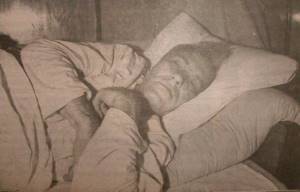
Shukshin. Postmortem photo
As for the refusal to perform a second autopsy, I repeat, times were tough, Soviet times. Now you can pay - and all problems are solved. Back then people were easily turned away. Perhaps the doctors simply did not see the point in this, because the cause of death was obvious to them.
And yes, let’s not forget about the main circumstance - in the last few years, Shukshin, as already mentioned, worked extremely hard, practically did not sleep, and all his relatives testify to this. Even the heart of an absolutely healthy person can not stand it - and the writer had a long-standing ulcer, since his youth, there was a period of passion for alcohol, which also, undoubtedly, had a negative impact on his general condition. Therefore, death against the background of coffee and cigarette intoxication no longer seems so absurd...
You can have different attitudes towards this tragedy. Everyone has the right to think differently. Some will remain of the opinion that it was a murder, others will think that Shukshin simply “burned out,” like many creative people, absolutely not sparing himself. This is not the main thing... What remains are wonderful works and films - amazingly folk, dear, touching the deepest strings of the Russian soul. Now no one doubts that the brilliant work of Vasily Shukshin is simply doomed to eternity...
And the ship on which Shukshin died is currently called “Alexander Blok”. It is moored at the International Exhibition pier near the Bagration Bridge in Moscow (in the Moscow City area), and the Chaika restaurant operates on it. Sometimes the old man even goes on flights. In 2021, they tried to “expel” it under the pretext of unsuitability, but the owners managed to defend the ship.

Motor ship "Alexander Blok"
Death of Vasily Shukshin or heart failure ordered by the KGB
His life was turbulent, his death strange. Her death, like the work of the great actor and director, is still discussed to this day.
Tragedy on the ship "Danube"
On that autumn evening in 1974, the artists, cruising along the Volga, honored Vyacheslav Tikhonov. The artist received another State Prize. There were many famous people here. Here, for example, is the merry fellow and joker Georgy Burkov, who was one of the last to leave the acting feast.
Already in the morning, on his way to his place, he passed by Vasily Shukshin’s cabin and, noticing a light under the door, entered without knocking. I saw that Vasily Makarovich was lying on the bed in some unnatural position, with his face turned towards the bulkhead. The glance came across a crooked hand lying on the chest, on the crumpled shirt, as if it was being torn, choking. Sensing something was wrong, Burkov did not come closer. I ran for help.
It was possible to suspect that sooner or later the creator of the famous “Kalina Krasny” would not be able to bear it. Devoting himself entirely to the filming process, the director did not spare his health, and the increasingly frequent serious attacks of peptic ulcer disease did not affect the work schedule.
However, immediately after Shukshin’s death, people and the acting community began to whisper that this was not a natural death. Someone helped a person die. So, experts said that Shukshin’s heart could not stand it from overload and drunkenness.
But before filming “They Fought for the Motherland,” the film’s director, Bondarchuk, arranged for Shukshin to be examined at the best Tskov hospital. And doctors did not find any heart problems.
As for alcohol, the actor has not taken a drop into his mouth for almost the last eight years. And his widow Lidiya Fedoseeva-Shukshina confirmed this, saying that her husband never complained about his heart.
Rumors or versions?
In general, someone somewhere once said that Shukshin could have been poisoned. And now talk about the ordered nature of the actor’s death has not ceased. Of course, they were conducted in whispers. There was a time when people were easily and permanently imprisoned for talking too much.
The most common version of Shukshin’s death among the people was the “Chekist version”. They say that that evening the so-called “infarction” gas was released into the cabin where Shukshin lived, with the help of which intelligence services of different countries often get rid of unwanted citizens, whose open murder can cause a great resonance. And cardiac arrest is just that.
There was also talk that the actor could have been simply poisoned. And, apparently, the one who found Shukshin, Georgy Burkov, could know more than others. Once, being “drunk” in the company of colleagues, in response to their cautious questions about the events that unfolded that night, he blurted out: “It wasn’t a blood clot and it wasn’t a heart attack, but a cup of coffee.”
And in a whisper he told the following story. It turns out that he and Shukshin went to his cabin in the evening and found coffee there that someone had carefully brought. It didn't surprise me though. Many knew that Shukshin abused this drink due to low blood pressure. So someone took care.
However, when Burkov, according to him, found Shukshin already dead in the morning, the cup of coffee from the table in his cabin disappeared. But it could contain the answer to the cause of death.
And if you also listen to the rumors that in Shukshin’s cabin there was a persistent smell of cinnamon, which is inherent in both the mysterious gas and some types of coffee, the version of a cunningly planned murder no longer looks fantastic.
Georgy Burkov also soon passed away. But, apparently, Shukshina shared his thoughts about death with his friends. For example, later the actor Pankratov-Cherny talked about this smell of cinnamon from the words of Burkov. He also talked about another “little thing” that few people paid attention to at the time.
In the cabin after the discovery of Shukshin’s body, everything was topsy-turvy: scattered manuscripts, clothes lying here and there. And this despite the fact that Shukshin was a very neat person who, excuse me, even put his toe on the chair when he went to bed. That is, in this case it could be concluded that someone was looking for something in Shukshin’s cabin and this someone had very little time...
So death or doom?
But these are not all the oddities that took place around Shukshin’s death. Much later, the chairman of the Volgograd branch of the Center V.M. Shukshina, a resident of the village of Kletskaya (not far from where the actor died on the ship) Dmitry Drannikov, said with reference to a local resident: “There are still different rumors in the village. And there are reasons for this. Evgenia Yakovlevna Platonova, partisan, wife of Hero of the Soviet Union Venedikt Platonov, is still alive. Evgenia Yakovlevna was taken as a witness. She said that when they arrived on the Danube, everything in the cabin was scattered. As if someone was looking for something. And Shukshin himself lay crouched. This in no way fits with the photograph of criminologists, where Vasily Makarovich lies in a well-kept cabin, covered with a blanket, as if sleeping. Clean boots also arouse suspicion among village residents. Why did he need to wash the kirzachi? After all, the next morning we’ll go back to filming in the morning. Our Cossacks are wondering who and what washed off his boots.”
But it turned out that even such doubts of Dmitry Drannikov are aggravated by the memories of Evgenia Platonova herself. According to her, when the investigator took her into the cabin, Shukshin was no longer there. Moreover, neither his clothes nor things were like that.
Apparently, the woman was taken to another cabin. For what? The answer suggests itself. To quickly make a document called “inspection of the premises.” But why this was done is a big mystery.
There were other versions of the death (or death?) of Shukshin. For example, journalists even reported that the actor’s heart stopped from... fright. Allegedly, before this, back in Moscow, Shukshin complained to his wife that it seemed to him that someone was watching him. And this someone could follow the actor on the ship. Perhaps this unknown person looked through the porthole or through the doorway, and Shukshin’s heart skipped a beat.
And here's what else is interesting. Despite the fact that Georgy Burkov seemed to be the first to discover Shukshin’s body, there are those who doubt it. They say that Burkov was allowed to be the “first” to discover the body only after they were sure that Shukshin was dead. Who allowed it, who made sure of it is also a mystery.
Another unanswered question is why the actor’s body was not transported to Volgograd for a long time. A specially called plane, on the instructions of the first secretary of the Volgograd regional committee, Panfilov, was already on the runway at four o'clock in the afternoon. But Shukshin was brought in only at six in the evening on a stretcher, in his underwear, covered with a flannelette blanket.
The autopsy was performed at the regional hospital, in the forensic medical examination department. Of the Volgograd doctors who were directly present, soon no one was left alive! At first glance, everyone died a natural death, but not all of them were at that old age when death seems natural!
And then some questions. The country's chief pathologist, Professor Georgy Avtandilov, flew specially from Moscow for Shukshin's autopsy and took all the examination materials with him to the capital. For what? Vasily Shukshin, of course, was a famous person. But not a prominent party member, minister or anything like that.
Maybe this was done in order to briefly write “heart failure” on the death certificate without any explanation - where did it come from? Moreover, Vasily Makarovich was treated for stomach ulcers all his life.
In general, the mystery of Shukshin’s death continues to remain a mystery, giving rise to new versions. Even the most shocking ones. For example, at one time there were rumors that his wife Lydia Fedoseeva-Shukshina was involved in the actor’s death. It’s good that at the time of the tragedy she was abroad on a business trip and there was no way she could have ended up on the Danube motor ship in the Volgograd region.
Of course, in fact, everything can be explained much simpler and, in Shukshin’s death... fate is to blame. But just as the forbidden fruit is sweet, so an unsolved mystery always gives rise to a hundred assumptions. And the author of each of them considers his own version to be the most truthful. Maybe this very truth is still gathering dust in the archives... of the special services?
